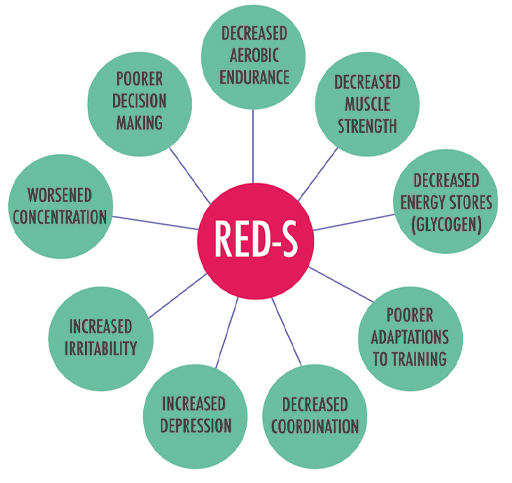4 The impact of RED-S on performance
You have seen in Activity 2 that Anna Boniface had to drop out of a marathon as she developed a stress fracture in her ankle, which highlights the increased risk of injury to the skeletal system. Being lighter, or having low body fat, may decrease the energy expenditure of running or cycling producing a short-term performance benefit.
Having low energy availability interferes with many of the mechanisms needed for optimal performance and impacts on several measures of fitness, as well as psychological measures. This is shown in Figure 2.
Eating less, or cutting out certain food groups, can lead to the body simply not having enough fuel to sustain itself. For example, endurance activities rely on food in the form of carbohydrates, which provide glycogen to produce energy as well as replenish energy stores afterwards. To build muscle and repair any damage caused by training an individual must consume foods rich in protein. Also fat intake is important as it provides the body with energy, supports cell growth, and helps the body absorb vital nutrients.
Psychological problems, such as depression and irritability, also feature in Figure 2. Mental health issues can be both a contributing cause to RED-S and a result of it. RED-S is not necessarily caused by eating disorders, such as anorexia nervosa [Tip: hold Ctrl and click a link to open it in a new tab. (Hide tip)] , but if an athlete has a high drive for thinness than anorexia can become a contributing factor to its development (Mountjoy et al., 2018). Often RED-S is caused by a poor nutritional strategy where an athlete does not plan their nutrition carefully enough to ensure that they gain enough calories to fuel their training and other daily activities.
Eating disorders, such as anorexia nervosa, can be a contributory factor in low energy availability but it is also a serious mental health problem. It is associated with an intense fear of gaining weight and often a distorted body image where an individual thinks they are overweight no matter how thin they become (NHS, 2021). Beatcharity has resources to help people suffering with eating disorders.

